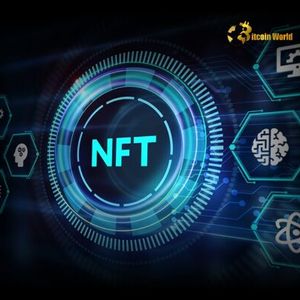BitcoinWorld AI Jobs: Unlocking the Difficult Tech Job Market for New Grads For many in the Bitcoin World community, technology isn’t just a tool; it’s the foundation of everything we do, from understanding blockchain mechanics to leveraging AI for trading insights. As the tech landscape evolves at lightning speed, so too does the path into a technology career. If you’re an aspiring developer or tech enthusiast looking to land your first professional role, you might be finding the door surprisingly hard to open. It’s not just you; the tech job market for newcomers has fundamentally shifted, presenting significant hurdles that weren’t there just a few years ago. Understanding the Shifting Tech Job Market The traditional path into a tech role often involved securing an entry level tech job right after graduation. These roles served as crucial stepping stones, allowing new professionals to gain practical experience, build networks, and develop specialized skills. However, recent data paints a challenging picture for this conventional route. Reports indicate a substantial pullback in hiring new graduates by large technology companies. Data from venture firm SignalFire shows that hiring of new grads by the 15 largest tech companies has dropped over 50% since 2019. Before the pandemic, graduates made up about 15% of hires at these firms; that figure has now fallen to just 7%. This significant reduction means fewer openings for those just starting their tech careers . Why Entry Level Tech Jobs Are Harder to Secure Several factors contribute to the increased difficulty in landing those initial roles: Economic Climate: The broader economic environment has led many companies, including tech giants, to become more cautious with hiring, prioritizing experienced talent who can immediately contribute to critical projects. Automation and AI: As highlighted by experts like LinkedIn’s chief economic opportunity officer, Aneesh Raman, AI is automating tasks that were previously handled by entry-level staff. This effectively removes some of the traditional ‘bottom rung’ positions on the career ladder. Basic data entry, preliminary coding tasks, and support functions are increasingly being handled by intelligent systems. Increased Competition: While the number of tech graduates continues to grow, the reduced supply of dedicated entry-level roles intensifies competition for the remaining positions. Higher Skill Requirements: Companies are increasingly seeking candidates who can contribute value quickly, often requiring more specialized skills even at the entry level than in the past. The Growing Demand for AI Skills Amidst the challenges, a clear demand signal is emerging: the need for AI skills . While AI might be contributing to the reduction in some traditional roles, it is simultaneously creating a surge in demand for new expertise. A survey found that 87% of hiring leaders now value AI experience, and nearly a quarter of all job postings now require it. This isn’t just about building AI models; it includes a range of competencies: Understanding machine learning concepts Data analysis and interpretation Prompt engineering and working with large language models Integrating AI tools into existing workflows AI ethics and governance For those aiming for AI jobs , demonstrating practical experience with AI technologies is becoming essential. Navigating Tech Careers in a Changing Landscape Despite the hurdles in securing traditional entry level tech jobs at big tech firms, the overall outlook for tech employment remains positive. The tech industry itself isn’t shrinking; rather, technology roles are becoming embedded across virtually all sectors. This presents a significant opportunity for aspiring professionals willing to look beyond the typical Silicon Valley giants. Tech jobs are projected to grow from 6 million this year to 7.1 million by 2034. While big tech hiring of new grads is down, companies in healthcare, finance (including FinTech and crypto), retail, manufacturing, and countless other industries are actively seeking tech talent. The unemployment rate for software developers, while not at historic lows, remains relatively low at 2.2%, half the national average. So, how can you position yourself for success in this evolving market? Here are some actionable insights: Acquire AI Skills: This is non-negotiable. Invest time in learning machine learning fundamentals, data science, or how to effectively use AI tools. Online courses, bootcamps, and personal projects are invaluable. Build a Portfolio Demonstrating AI Proficiency: Create projects that showcase your ability to work with AI, analyze data, or develop software that integrates AI functionalities. Highlight these on platforms like GitHub. Look Beyond Big Tech: Explore opportunities in various industries. Companies in healthcare, finance, energy, and agriculture need tech professionals, and they may offer more accessible entry points. Network Strategically: Attend industry events (both tech and AI-focused), connect with professionals on LinkedIn, and participate in online communities. Networking can uncover hidden opportunities. Emphasize Adaptability and Continuous Learning: The pace of technological change means that the ability to quickly learn new tools and concepts is highly valued. Make this a core part of your professional narrative. The Future of AI Jobs and Tech Careers The trajectory suggests a future where tech roles are pervasive, and AI skills are foundational. The growth in AI jobs isn’t limited to specialized AI researcher positions; it extends to developers who can integrate AI, data analysts who can interpret AI outputs, and product managers who can build AI-powered products. For those interested in the crypto space, this convergence is particularly relevant, with increasing applications of AI in areas like market analysis, security, and decentralized applications. While the path to an entry level tech job might be more challenging than in previous years, it is far from impossible. It requires a more strategic approach, a focus on in-demand skills like AI, and a willingness to explore opportunities across a broader range of industries. The demand for tech talent, especially those with relevant AI expertise, is projected to grow, offering a promising future for those who adapt and prepare effectively. To learn more about the latest AI market trends, explore our article on key developments shaping AI features. This post AI Jobs: Unlocking the Difficult Tech Job Market for New Grads first appeared on BitcoinWorld and is written by Editorial Team



















